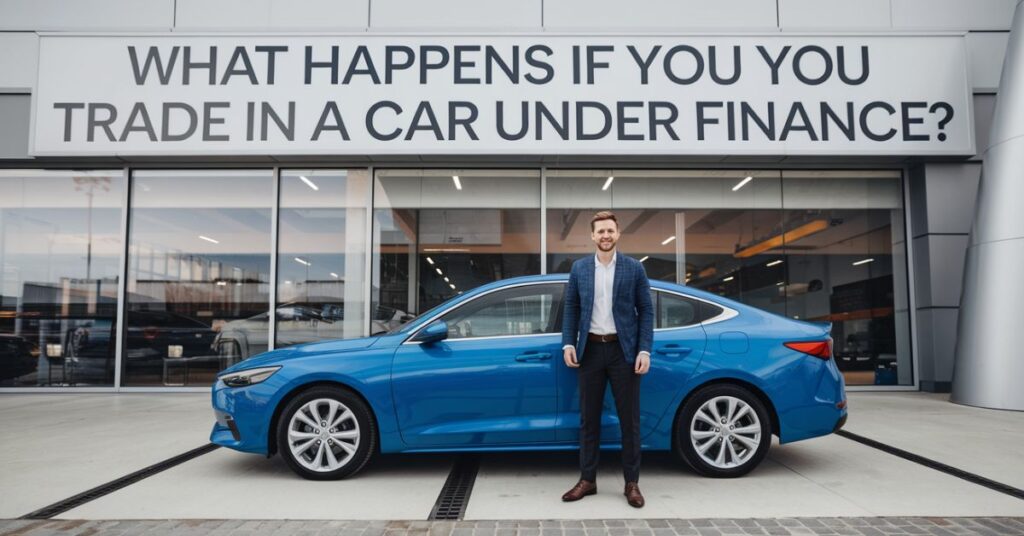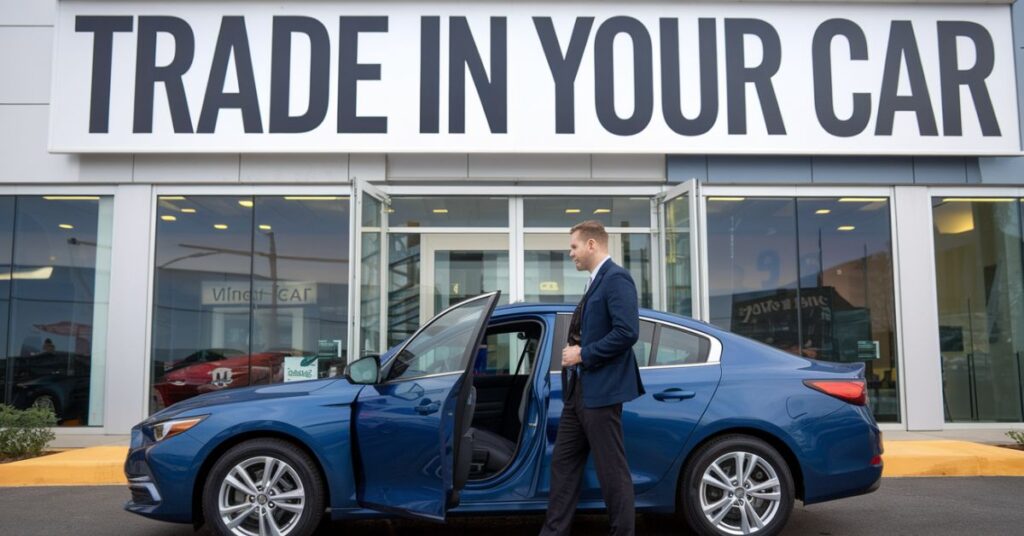Trading in a car that’s still under finance can be a tricky process, fraught with potential pitfalls and unexpected complications. Yet, for many Americans, it’s a necessary step towards upgrading their vehicle or adjusting their financial commitments. This guide dives deep into the intricacies of trading in a financed car, offering valuable insights and practical advice for navigating this complex transaction. What happens if you trade in a car under finance?
How Do I Trade In My Car That Is Still Under Finance?
The process of trading in a financed car varies depending on whether your vehicle is financed through a dealership or an independent lender. Let’s explore both scenarios to give you a clear picture of what to expect.
Related Post: What happens if you trade in a car under finance?
Car Financed Through a Dealership
When your car is financed through a dealership, the trade-in process can be somewhat smoother, as the dealer has direct access to the loan information. Here’s a step-by-step breakdown:
- Contact the dealership: Reach out to the dealership where you purchased the car and inform them of your intention to trade in the vehicle.
- Get a payoff quote: The dealer will provide you with a payoff quote, which is the amount you still owe on the car.
- Vehicle appraisal: The dealership will assess your car’s current market value.
- Negotiate the trade-in: Based on the appraisal, you’ll discuss the trade-in value with the dealer.
- Settle the loan: If your car’s value exceeds the payoff amount, you’ll have positive equity to put towards your new vehicle. If it’s less, you’ll need to pay the difference or roll it into a new loan.
Pro Tip: Always research your car’s value independently using resources like Kelley Blue Book or NADA Guides before negotiating with the dealer.
Car Financed Through a Lender

If your car loan is through a bank or credit union, the process requires a few additional steps:
- Contact your lender: Reach out to your lender to get an up-to-date payoff amount.
- Inform the dealer: Let the dealership know that your car is financed through an external lender.
- Authorize communication: You may need written authorization for the dealer to communicate with your lender.
- Negotiate and settle: The dealer will negotiate the trade-in value and handle the payoff process with your lender.
- Transfer of title: Once the loan is paid off, the lender will transfer the title to the dealership.
Remember: The process might take longer when dealing with an external lender, so patience is key. What happens if you trade in a car under finance?
Quick Overview of the Car Trade-In Process with a Loan
To give you a bird’s-eye view of the entire process, here’s a quick rundown of what happens when you trade in a financed car:
- Evaluate your car’s worth
- Determine the payoff amount
- Calculate equity (positive or negative)
- Negotiate with the dealer
- Complete the transaction
Pros and Cons of Trading In a Financed Car
Before diving into the trade-in process, it’s crucial to weigh the advantages and disadvantages:
| Pros | Cons |
|---|---|
| Convenience – one-stop solution | Possible negative equity |
| Potential tax benefits | Limited negotiating power |
| Immediate debt resolution | Potential for financial loss |
Pros Explained:
- Convenience: Trading in at a dealership allows you to handle everything in one place.
- Tax benefits: In many states, you only pay tax on the difference between your trade-in value and the new car’s price.
- Debt resolution: Trading in can help you get out of a loan you’re struggling to pay.
Cons Explained:
- Negative equity: If you owe more than the car is worth, you’ll have to pay the difference or roll it into a new loan.
- Limited negotiation: Dealers may offer less for a trade-in than you’d get in a private sale.
- Financial loss: You might not get the best value for your car, especially if it’s relatively new.
Does Trading In a Financed Car Hurt Your Credit?
Trading in a financed car doesn’t directly impact your credit score, but related factors can affect it:
- Loan payoff: Successfully paying off your loan can positively impact your credit.
- New loan: Taking on a new loan for your next vehicle will result in a hard inquiry on your credit report.
- Debt-to-income ratio: If your new loan has higher payments, it could increase your debt-to-income ratio.
Key takeaway: While the trade-in doesn’t hurt your credit, be mindful of how the new loan terms might affect your financial health. What happens if you trade in a car under finance?
Tips When Trading In Your Car Under Finance
To ensure a smooth trade-in process and protect your financial interests, consider these essential tips:
Be Upfront About Your Situation
Transparency is crucial when trading in a financed car. Here’s why:
- It builds trust with the dealer
- Allows for more accurate negotiations
- Prevents last-minute surprises that could derail the deal
Always disclose:
- The existence of a loan on the vehicle
- The name of your lender
- The approximate payoff amount
Understand the Risks
Trading in a financed car comes with potential risks:
- Negative equity: If you owe more than the car is worth, you’ll be responsible for the difference.
- Rolling over debt: Adding negative equity to a new loan can put you in a worse financial position.
- Overpaying for the new car: Dealers might inflate the price of the new car to offset a generous trade-in offer. What happens if you trade in a car under finance?
Talk to Your Lender
Communication with your lender is vital. Here’s what to discuss:
- Exact payoff amount
- Any prepayment penalties
- Process for transferring the title
Questions to ask your lender:
- “What’s my current payoff amount?”
- “Are there any fees for early loan termination?”
- “How long will it take to process the title transfer?”
FAQs
Q: Can I Trade In a Financed Car in Ireland?
While this guide focuses on the USA, it’s worth noting that the process in Ireland is similar but with some key differences:
- In Ireland, you must settle your finance agreement before trading in the car.
- The concept of ‘negative equity’ is less common in Irish car finance deals.
- Irish dealers may be less willing to handle the paperwork for settling existing finance.
Q: Can You Trade In a Bad Car?
Yes, you can trade in a car in poor condition, but keep in mind:
- The trade-in value will be significantly lower
- Some dealers may refuse extremely damaged vehicles
- You might be better off selling it for parts or to a scrapyard
Q: Can You Trade In a Slightly Damaged Car?
Trading in a slightly damaged car is possible, but it will affect the value:
- Minor scratches and dents can reduce the value by 5-15%
- Mechanical issues can have a more significant impact
- Be prepared for a lower offer than you might expect
Tip: Consider getting minor damages repaired before trading in if the cost is less than the potential increase in trade-in value.
Q: Is It Best to Trade In a Car?
Whether trading in is the best option depends on your specific situation:
Pros of trading in:
- Convenience
- Potential tax savings
- Simplified process
Cons of trading in:
- Potentially lower value compared to private sale
- Less control over the sale price
Alternative: Selling privately often yields a higher price but requires more time and effort.
Conclusion
Trading in a car under finance is a complex process that requires careful consideration and planning. By understanding the intricacies involved, from dealing with lenders to negotiating with dealers, you can navigate this transaction more confidently. Remember to always do your research, be transparent about your situation, and consider all your options before making a decision. While trading in a financed car can be a convenient way to upgrade your vehicle or adjust your financial commitments, it’s crucial to ensure that the decision aligns with your long-term financial goals.





